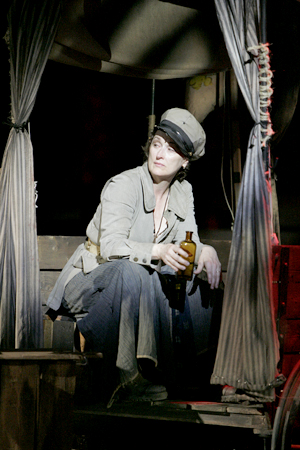|
Reviews of Recent Independent, Foreign, & Documentary Films in Theaters and DVD/Home Video
Edited & Directed by John Walter Produced by Nina Santisi Released by White Buffalo Entertainment USA. 95 min. Not Rated With Barbara Brecht-Schall, Jay Cantor, Oskar Eustis, Kevin Kline, Tony Kushner, Meryl Streep, Jeanine Tesori, Carl Weber & George C. Wolfe Bertolt Brecht’s play Mother Courage and Her Children is set during the Thirty Years War, a conflict that began as a battle over religion but eventually turned into a power struggle that managed to draw in a wide array of European countries, all with their own various interests that went far beyond religion. That war is in many ways a microcosm of all wars, and Mother Courage has often been produced to reflect whichever war is current. The universality of the Thirty Years War is the universality of Mother Courage. John Walter’s documentary Theater of War is ostensibly about the 2006 Public Theater/Shakespeare in the Park production of the play starring Meryl Streep, Kevin Kline, and Austin Pendleton, which was ostensibly about the Iraq war. But the production was about all wars, and the film is about more than “how we put on a show.” As Streep aptly says, inviting people in to film actors working on a play isn’t very interesting; it’s rather like inviting people to look at a building under construction and showing off the pipes and plumbing. It’s necessary, but it’s often dreary and monotonous. Walter, instead, uses the production as a meditation on numerous topics—Brecht and his relationship to communism, Marxism, and how that contributed to his understanding of war. Interviews with Carl Weber, a theater professor who worked with Brecht, Jay Cantor, a professor teaching a class on Marx, and Tony Kushner, who wrote the translation used in the production, illuminate the connection between all of Walter’s ideas. Footage of everything from antiwar protests and photos from the 1949 Berlin production starring Brecht’s wife, Helene Weigel, help bring it all to life. That’s not to say there’s not plenty here for theater junkies to enjoy—Streep being Streep (and being Mother Courage, of course) is always a joy to watch. It’s fascinating to see how Jeanine Tesori composed on the spot songs just for this cast and production. There’s not a lot of time spent on the rehearsal process (see Ms. Streep’s comments above), but Walter does quietly slip in footage of the initial table read and of a rehearsal room. Walter ties
his many ideas together in a neat, seamless way, and the film is never
boring, whether you see it because you expect an antiwar polemic, a
biography of Brecht, or a behind the scenes glimpse of Streep, Kushner,
and director George C. Wolfe at work. All of those aspects of the film
are worthwhile, but for me, the most striking part was the scenes of a
devastated Berlin immediately after World War II, along with photos of
the 1949 production of the play. To see the shattered city and that
there were still audiences to attend a play is to be reminded of the
indomitability of theater. It survives and people need it, whether for
entertainment, confirmation of old beliefs, or introduction of new
ideas. Theater matters. Art matters.
Kirsten Anderson
|


